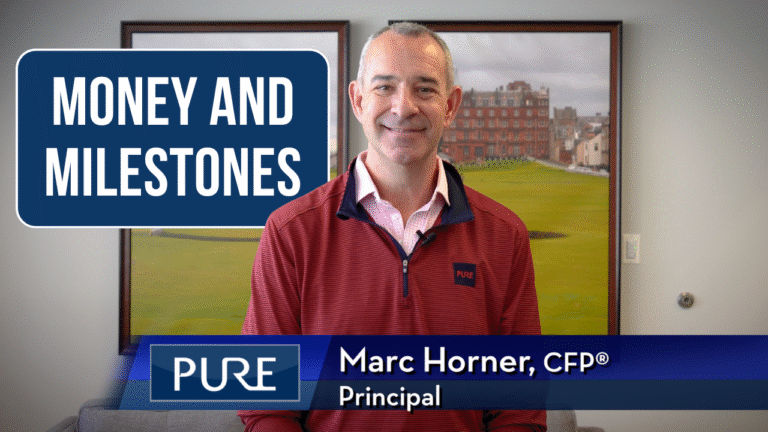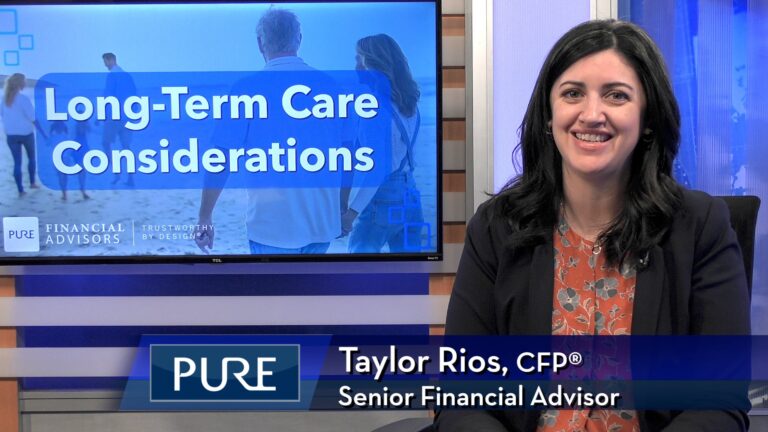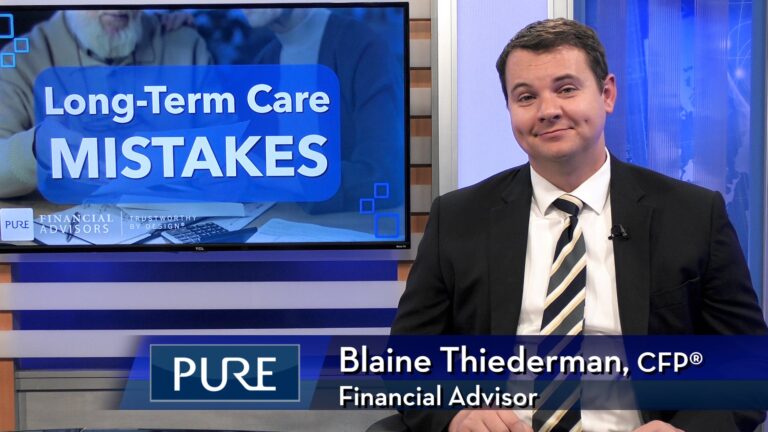What does it take to be financially successful? Pure’s Senior Financial Advisor, Matt Balderston, CFP®, AIF®, breaks down the essential—yet often overlooked—principles that can help you make smarter financial decisions for a better future for you and your loved ones.
Transcript
One of our primary responsibilities here at Pure is to help people make smart financial decisions. Many of those decisions can be complex, but everyone can start with a handful of basic, prudent concepts which despite their simplicity, are crucial to financial success. So, today, I’m going back to those basics with three key principles to financial success.
First: Compounding.
One of my favorite quotes is from Einstein, “The most powerful force in the universe is compound interest.” The ability to double your money, then redouble it, then do it again and again, will turn out to be one of the biggest factors in how much of a nest egg you’re able to build. Of course, time is the most important variable in that equation, but no matter how old you are, the key to maximizing compounding is to start now.
Second: Invest in the stock market.
The way to maximize compounding is by targeting growth, and the stock market offers one of the best and most accessible methods of doing that. Because of its volatility, how much you have in the stock market will be a function of your goals, risk tolerance, time horizon, etc., but if you’re trying to build wealth, some portion should be in stocks. How you invest in stocks can differ, too, but a good way to start is through index funds or target date funds. If you’re sophisticated enough to put together a diversified portfolio, index funds are low-cost ways to get broad diversification. Target date funds provide the diversification without you having to build the portfolio yourself. Both methods involve diversification to avoid over concentration in any one category. For example, as great as the S&P 500 has been for quite a while now, in the first decade of the 2000’s it was just about the only index where you would have lost money over those 10 years. Holding multiple asset classes helps reduce the impact of being in the wrong holdings at the wrong time.
Third: Live within your means.
If you’re spending everything you make, you can’t invest. And even worse, if you’re spending more than you make, you’re being undermined by reverse compounding. Paying interest on purchases you made in the past causes the ultimate cost of those purchases to potentially double or more. My biggest tip to living within your means is to pay yourself first. As Warren Buffet put it, “Don’t save what you have after you spend, spend what you have after you save.” Making contributions to an employer plan is a great way to do that, and if you don’t have an employer plan, you can set up an auto-deposit to a personal investment account timed with when you get paid.
So, like I said earlier, those may be basic, but they’re extremely important and are worth reviewing. It’s amazing how much of people’s overall financial success hinges on just those habits. If you would like to see how we might help you on the path to financial success, contact Pure for a free financial assessment.
Subscribe to our YouTube channel.
IMPORTANT DISCLOSURES:
• Investment Advisory and Financial Planning Services are offered through Pure Financial Advisors, LLC, a Registered Investment Advisor.
• Pure Financial Advisors LLC does not offer tax or legal advice. Consult with your tax advisor or attorney regarding specific situations.
• Opinions expressed are subject to change without notice and are not intended as investment advice or to predict future performance.
• Investing involves risk including the potential loss of principal. No investment strategy can guarantee a profit or protect against loss in periods of declining values.
• All information is believed to be from reliable sources; however, we make no representation as to its completeness or accuracy.
• Intended for educational purposes only and are not intended as individualized advice or a guarantee that you will achieve a desired result. Before implementing any strategies discussed you should consult your tax and financial advisors.
CFP® – The CERTIFIED FINANCIAL PLANNER® certification is by the CFP Board of Standards, Inc. To attain the right to use the CFP® mark, an individual must satisfactorily fulfill education, experience and ethics requirements as well as pass a comprehensive exam. 30 hours of continuing education is required every 2 years to maintain the certification.
AIF® – Accredited Investment Fiduciary designation is administered by the Center for Fiduciary Studies fi360. To receive the AIF Designation, an individual must meet prerequisite criteria, complete a training program, and pass a comprehensive examination. Six hours of continuing education is required annually to maintain the designation.












